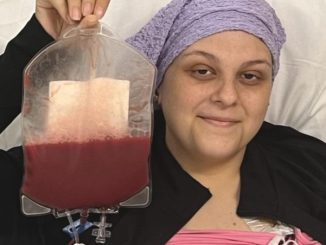
Eight people in St. Charles Parish are getting a second chance at living a clean, drug-free life. They graduated from Drug Court on July 25, after spending the last year and a half in the parish rehabilitation program.
The drug court was established in 2001, to put an end to drug addiction and drug-related crimes parish wide.
Two graduates on the road to recovery, Destiny Beard, 25 of New Sarpy and Jeffery Judd, 32 of St. Rose said the second chance they’re getting through the drug court program has opened their eyes to the importance of staying drug free.
“I was around drugs at a very young age,” Beard said.
After the death of a family member, both father and daughter masked their pain by using drugs.
Both father and daughter are drug free now, but remember using narcotics together to help them deal with a family crisis.
“I can remember using drugs with my father who was also a drug addict at the time when my brother died,” she continued.
“We were trying to get through the pain of losing my brother, his son.” Beard continued.
Beard said eventually her drug habit grew worse.
“I started using crack-cocaine and prescription drugs that I bought off the street,” she said.
“I was arrested and two months into my incarceration I was placed on the drug court program, so I could get clean and now I’m drug free, on my way to real estate school and I learned to deal with my issues in other more practical ways.”
Another graduate, Jeffery Judd, was a drug dealer and drug user and says he can’t forget the night when six deputies from St. Charles Parish Narcotics unit, kicked his door in and stormed his small apartment looking for drugs.
“I had some drugs on me, some cocaine and marijuana, but I was just doing it for recreational purposes,” he said.
“I’ve been a part of the drug court program for about two years; I have two steady jobs and just got a house and a new van. The program works,” he said.
The current Drug Court Judge and three other judges rotate the position on an annual basis. Drug court is handled by the judges in addition to their regular docket schedule.
Judge Kirk Granier currently presides over drug court and makes the tough decision on whether or not an inmate will benefit from the program, or should face jail time.
“It doesn’t make a whole lot of sense to incarcerate a drug addict,” Granier said.
“The primary focus of drug court is to break the cycle of addiction and to rehabilitate substance-abusing offenders.” he continued.
Granier said they do track graduates to monitor the success of the relatively new program.
“We rarely see our graduates using again, but anytime we do we are disappointed,” he said.
“What the graduates need to understand is there’s no second chance, once you fail the program you will have to serve your jail sentence.”
The 29th Judicial Court only accepts drug offenders that they think can benefit from the program. These include adults who have been arrested for DWI, drug possession and/or distribution, or addiction-driven property crimes.
“The program has five phases,” Jackie Cristina, coordinator explained.
Each phase involves urine screenings, court appearances, group counseling sessions, and attendance of 3 AA meetings a week. Participants must be employed full time or perform 20 hours a week community service. Clients must obtain their GED while in the program if they do not already have their high school diploma.
Drug court receives $4,500 per year, per person for drug court participants. The money is allocated by the Louisiana Legislature and administered through the Supreme Court Drug Court Office.
“The amount of money is small compared to the cost of housing DOC inmates-$22.39 per day ($8,172.35 per year) and, more importantly, when compared to the number of lives that are changed through the drug court program,” Cristina said.
Since November 2001, there have been 46 drug court graduates.
Gregory Johnson, compliance officer for the program has the responsibility of going door-to-door of each program participant to make sure they are following the rules.
“I will go on your job and give you a random drug test,” he said.
“I will show up at your house at 2:00 in the morning if that’s what it takes to keep these individuals on the right path,” he continued.
“I’m proud of this program and the participants work hard and change for the better.”




Be the first to comment